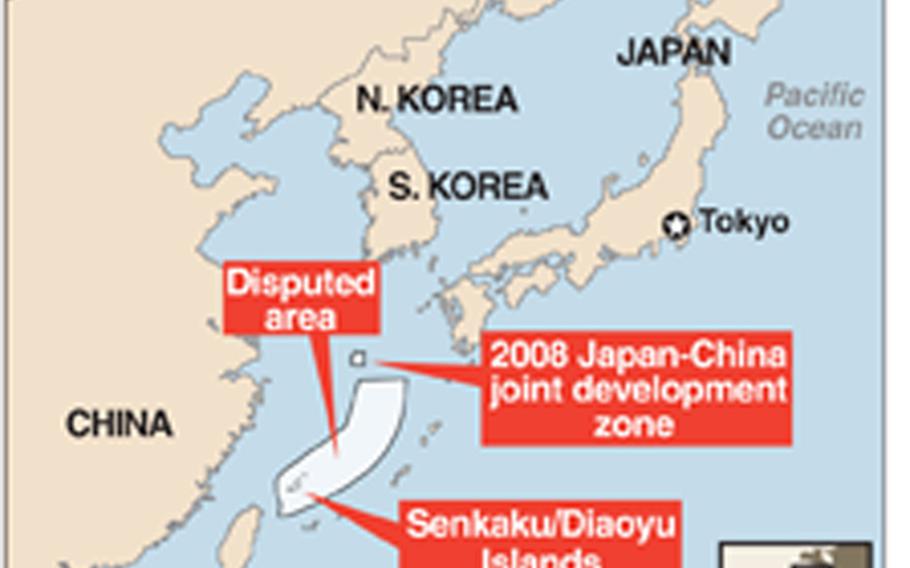
(Noga Ami-rav/Stars and Stripes)
YOKOSUKA NAVAL BASE, Japan — Japanese government officials said Wednesday they would explore nationalizing a remote island chain at the center of longstanding territorial tensions with China, two days after Tokyo’s governor said his prefecture was considering buying the privately held islands.
Chief Cabinet Secretary Osamu Fujimura said during a press conference Wednesday that the government is gathering information on the remarks made by Tokyo Gov. Shintaro Ishihara, who told a conservative Washington D.C. think tank on Monday that he wanted Tokyo prefecture to purchase the uninhabited Senkaku Islands.
When Fujimura was asked if there is a plan to purchase the islands, which the government currently leases, he said it may seek a way to nationalize the islands.
“If necessary, there is a possibility that we may move forward toward that idea,” Fujimura said.
The owner of the chain’s main islands is receptive to selling them, the owner’s brother told Japanese broadcaster NHK Wednesday.
On Monday, Ishihara told The Heritage Foundation that he has been negotiating with the owner of the islands, which are administered by Japan but also claimed as the Diaoyu Islands by Beijing.
“So, the Senkaku Islands will be purchased by the Tokyo Metropolitan Government, and the Senkaku Islands will be a very good fishing ground,” Ishihara said through a translator. “I don’t know whether the central government is courageous enough to do that, but anyway, we will do whatever it takes to protect our own land. Is there any complaint? Is there any problem about that?”
Several parties could have a problem with that, especially if it ignites maritime tensions in the East China Sea.
The official U.S. position is not to take a stance on the “ultimate sovereignty” of the islands, which lie about 1,200 miles southwest of Tokyo and 100 miles north of Japan’s Ishigaki Island. U.S. Navy and U.S. Embassy officials in Japan reiterated that position through message exchanges with Stars and Stripes on Wednesday.
However, Secretary of State Hillary Clinton, former Defense Secretary Robert Gates and others have publicly reiterated that the United States is obligated to defend the islands under the Japan-U.S. security alliance.
Ishihara’s comments drew a rebuke from Chinese Foreign Ministry spokesman Liu Weimin on Tuesday.
“The Diaoyu Islands since ancient times have been Chinese territory and China has indisputable sovereignty,” Liu Weimin told reporters, according to a translated post on China’s Foreign Ministry website. “Unilateral initiatives that Japan takes on the Diaoyu Islands are illegal and invalid.”
Chinese ships have transited Japanese-claimed territorial waters bordering the islands in recent years, inciting Japanese protest. In Sept. 2010, a Chinese fishing vessel rammed a Japanese Coast Guard ship near the islands, prompting the arrest of the ship’s captain.
Japan released the captain after China retaliated by arresting Japanese nationals in China and suspending shipment of “rare earth” materials used in electronics manufacturing.
On Tuesday, Japan’s foreign minister matched Liu’s rhetoric about his respective nation’s claim to the disputed island chain being “indisputable.”
Foreign Minister Koichiro Gemba told reporters Tuesday that he was unaware of Ishihara’s specific plans, though he did hear about his speech through media reports.
“Therefore, I will refrain from answering any questions about it at this point,” Gemba said, according to a ministry transcript. “However, in any event, the Senkaku Islands have always been Japanese sovereign territory, which is an undisputed fact from the historical aspect as well as from the standpoint of international laws. In fact, the islands have been effectively under Japan’s control. That is just about it, isn’t it?”
The government of Taiwan also claims the islands, though it has not recently taken any action to claim them.
Also on Wednesday, Mayor Yoshitaka Nakayama of Ishigaki City said he supported Ishihara’s plan, and that his city would pay to co-own the islands.
The islands were of little consequence when they were transferred to the United States following Japan’s surrender at the end of WWII.
That changed when United Nations reports in the late 1960s and 1970s speculated that the nearby seabed held unexplored gas and oil deposits. The area is also prized as a fertile fishing ground.
The United States returned Senkaku, along with Okinawa and the Ryukyu Islands, to Japan in 1972. The Japanese had previously gained the islands from China after winning the Sino-Japanese War in 1895.